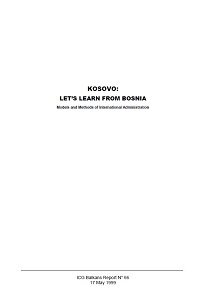KOSOVO: LET’S LEARN FROM BOSNIA. Models and Methods of International Administration (ICG Balkans Report N° 66)
KOSOVO: LET’S LEARN FROM BOSNIA. Models and Methods of International Administration (ICG Balkans Report N° 66)
Author(s): Author Not Specified
Subject(s): Public Administration, Peace and Conflict Studies, Wars in Jugoslavia
Published by: ICG International Crisis Group
Summary/Abstract: After almost three and a half years working in Bosnia to implement the Dayton Peace Agreement, the international community will soon face the prospect of establishing a presence in Kosovo. The model proposed at Rambouillet was very similar to that set up at Dayton, but the situation now is very different. This report examines the international effort in Bosnia to see whether lessons can be drawn for Kosovo and other possible future international administrations. At Dayton it was assumed that military implementation would be harder than civilian, so the two were kept rigidly separate, and the role allotted to civilian implementation was to give a ‘helping hand’ to the Bosnian authorities, who were assumed to want to co-operate with implementation. The Rambouillet agreement preserved the same division between civilian and military implementation as Dayton. Yet experience in Bosnia has shown that a helping hand has not been enough since the Bosnian parties have not in fact co-operated among themselves or with the internationals. In response, the High Representative in Bosnia has gradually taken on extra powers, but his ability to use them effectively is limited because he still has no force at his disposal to back him up. However many powers he appears to have, he will always face this problem, even if a so-called ‘protectorate’ is established. Currently, influence over aid is his only real power.
Series: ICG Balkans Report
- Page Count: 28
- Publication Year: 1999
- Language: English
- Content File-PDF
- Introduction

